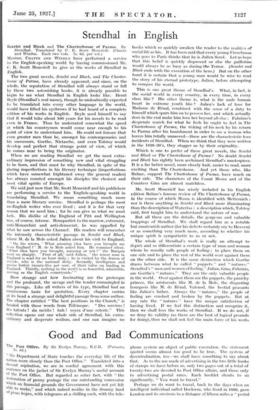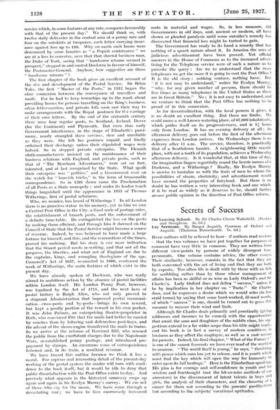Good and Bad Communications
The Post Office. By Sir Evelyn Murray, K.C.B. (Putnam. 78. gd.) " Xo Department of State touches the everyday life of the nation more closely than the Post Office." Translated into a devout aspiration, we are in cordial agreement with this sentence on the jacket of Sir Evelyn Murray's useful account of the Post Office. But regarded as sober fact, with " the restoration of penny postage the one outstanding concession Which on financial grounds the Government have not yet felt able to make," and which indeed resides in, the dreamy land of pious hopes, with telegrams at a shilling each, with the tele-
phone system an object of public execration, the statement quoted seems almost too good to be true. The system of decentralization, too—we shall have something to say about that. As to the use made of advertising in the two little books of stamps we have before us, only two pages out of a total of twenty-two are devoted to Post Office affairs, and those only to advertising postal rates. Each booklet shouts to us significantly, " You want to travel."
Perhaps we do want to travel, back to the days when an intelligent individual called Dockwra, who lived in 1680, gave London and its environs to a distance of fifteen miles a " postal
service which, in some features at any rate, compares favourably with that of the present day." We should think so, with twelve daily deliveries in the central area at a penny rate and four on the outskirts at twopence, each letter carrying insur- ance against-loss up to MO: Why on earth such boons Were denounced by some fanatics as " a Popish contrivance " we are at a loss to conceive, save that that shrewd business man, the Duke of York, seeing that " handsome returns seemed in prospect," stepped in and ousted Dockwra in favour of himself, the Postmaster-General. Anyhow, how suggestive are those " handsome returns " !
The first chapter of the book gives an excellent account of the rise and development of the Postal Service. Sir Brian Tuke, the first- " Master of the Posts," in 1512 began the close connexion between the conveyance of travellers and mails. For he had to keep townships up to the mark about providing horses for persons travelling on the King's business, often letter-carriers, and private folk soon saw their way to make arrangements with the Royal postmen for tic carriage of their own letters. By the end of the sixteenth century there were four regular posts, to Scotland, Ireland, Dover (for the Continent) and Plymouth. But even thus early Government interference, in the shape of Elizabeth's parsi- mony, nearly strangled these services, slow and unreliable as they were. She left her postmen unpaid, and finally ordained their discharge unless their stipulated wages were halved. So in stepped private enterprise. The Flemish cloth-manufacturers insisted on the maintenance of their business relations with England, and private posts, such as that of " The Merchant Adventurers," were set on foot, tolerated, and at last recognized by the State. What spoilt their enterprise was " polities," and a Government ever on the watch for " knavish tricks," in the form of treasonable 'correspondence. So in 1591 down came the Proclamation of all Posts as a State monopoly ; and undez its leaden touch things languished until the appearance in 1635 of Thomas Witherings, first of postal reformers.
Who, we wonder, has heard of Witherings ? In all London there is no graceless statue to his memory, yet to him we owe a Central Post Office in the City, a fixed scale of postage rates, the establishment of branch posts, and the enforcement of a definite time-table. He extinguished the loss on the pdsts by making them efficient, and through him it dawned on the Council of State that the Postal Service might become a source of revenue. Indeed, he was believed to have made a large fortune for himself, and this, and the commotions of the times, proved his undoing. But his story is one more indication that the Stuart period needs re-writing, and that not all the progress, the liberties, and what not of England are due to the captains, kings, and wrangling theologians of the age. Cromwell's Act of 1657, re-enacted in 1660, confirmed the work of Withering's,- the main feattires of which exist to the present day.
We have already spoken of Dockwra, who was really stirred to ambitious action by the absence of postal facilities within London itself. His London Penny Post, however, was legalized by the Act of 1711, and the next hero of postal history is Ralph .Allen, who not only proved. to a stagnant Administration that improved postal communi- cation—cross-posts and by-posts—brings its own reward, but kept a goodly portion of the reward in his own pocket.
It was John Palmer, an enterprising theatre-proprietor in Bath, who convinced Pitt that the mails had better be carried by coaches than by loitering and defenceless post-boys, and the advent of the steam-engine transferred the mails to trains.
So we arrive at the reforms of Rowland Hill, who rescued the public from the exorbitant charges due to the Napoleonic Wars, re-established penny postage, and introduced pre- payment. by stamps. An enormous mass of correspondence followed and, in its train, a resultant revenue.
We have traced this outline because we think it has a moral. For copious and interesting detail of the present-day working of the postal system the reader will turn with confi- dence to the book itself, but it would be idle to deny that public dissatisfaction with the Post Office exists to-day. And
precisely what appears in -the historical summary crops up again and again in Sir Evelyn Murray's survey. • We are not of those who cry for the moon. We hatie conic through a devastating war ; we have to face enormously increased costs in material and wages. So, in less measure, did GovernMents in old—days, and, ancient or modern, all have shown or pleaded paralysis until some outsider's remedy has discovered that financial loss might be turhed to gain. • - -The Government has ready to its hand a remedy that has nothing of a quack nature about it. In America the uses of judicious advertiSenient have been proved. Yet official answers in the House of Commoni as to the increased adver- tising for the Telephione service were of such a nature as to 'provoke 'the query Are we to • understand that 'the more telephones we get the more it is going to cost the Post Office It is the old story : nothing venture, nothing haVe: But " it is not -easy to understand," writes Sir Evelyn Murray, " why, for any given number of persons, there • Should be five times as many telephones in the United States- as there arc in Great Britain." No ; it is not easy to understand, and we venture to think that the Post Office has nothing to be proud of in this connexion.
As for decentralization, with the local powers it gives, it is no - doubt an excellent -thing. Bitt there are limits. We could name a well-kniown watering place, of 67,000 inhabitants, which prides itself on its progressiveness, and is 1; hours only from London: It has no evening delivery at all ; its afternoon delivery goes out before the first of the afternoon expresses from London arrives. On Wednesdays there is no delivery after 11 a.m. The service, therefore; is practically
that of a Southdown hamlet. A neighbouring little seaside place, with not a tenth of its population, achieves a Wednesday afternoon delivery. Is it wonderful that, at this time of day, the imagination lingers regretfully round the heroic names of a Dockwra, and a Witherings ? Really, Sir Evelyn Murray is unwise to tantalize us with the feats of men to whom the possibilities of steam, electricity, and advertisement would have seemed the properties of fairyland. But there is no doubt he haS written a very interesting book and one which, if it be read as widely as it deserves to be; should further arouse public opinion in the direction of Post Office reform.















































 Previous page
Previous page